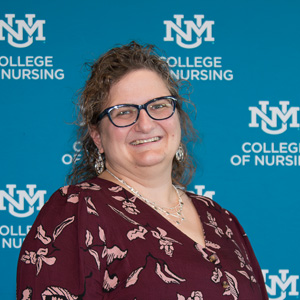In the realm of health care, where the needs of vulnerable populations are continually evolving, the role of Maternal Child Health (MCH) practitioners stands out as pivotal. Their work spans from the earliest stages of pregnancy to the well-being of adolescents, encompassing a spectrum of care that shapes the foundation of families and communities. Now, a pioneering graduate from The University of New Mexico’s College of Population Health (COPH) is playing an instrumental role in this arena.
In a recent interview, COPH Director of Undergraduate Programs, Tammy Thomas, PhD, MSW, MPH, delved into the experiences and insights of Courtney Grassham, NP, an alumna from the MCH certificate program.
Grassham, born and raised in Waco, Texas, began her journey in health care as a candy striper - a junior hospital volunteer who typically assists patients and staff with non-medical tasks, providing comfort and support in health care settings. After graduating with a bachelor of science in nursing in May 2005, she ventured to New Mexico as a travel neonatal intensive care unit (NICU) nurse, a decision that proved transformative during her three-month contract. Inspired to further her education, Grassham earned her first master’s degree as a neonatal nurse practitioner at Vanderbilt University in 2007, balancing her studies with clinicals at UNM.
Since then, Grassham has been an essential resource in neonatal care, initially at UNM Hospital and now at Presbyterian Hospital, tirelessly tending to the needs of premature and critically ill newborns. Her expertise spans a wide spectrum, from essential procedures like intubation and central line placement to the holistic management of neonatal care, embodying her commitment to comprehensive well-being for infants and their families.
Grassham’s dedication extends beyond her professional responsibilities; she actively contributes to the community as a board member of Lexiam Heart Foundation, a nonprofit dedicated to supporting families impacted by congenital heart defects in New Mexico. Her commitment stems from a deep understanding of the necessity for enhanced behavioral and mental health support for the NICU parents and families dealing with complex medical conditions in the state. Grassham leverages her position to advocate for and implement initiatives that address these critical needs, ensuring families receive comprehensive support during challenging times.

I’ve always been the type to build relationships with the families that I take care of. I’m honored to still keep in touch with many of my former patients and their families.
Reflecting on her journey, Grassham highlights the remarkable advancements in neonatal care that have facilitated the survival of infants born prematurely, some as early as 22 weeks. However, alongside these medical achievements, Grassham remains committed to prioritizing the emotional well-being of families and the critical role of maternal mental health in the broader context of maternal child health.
As Grassham navigated her education path, she found herself drawn to the interdisciplinary nature of the MCH certificate program at UNM. The program, aimed at connecting different areas of expertise within health care, provided Grassham with an opportunity to delve into diverse viewpoints and discover creative solutions to intricate problems. Through her coursework, Grassham gained insights into Title 5 funding, a crucial federal program under the Social Security Act. Title 5 funding is designed to support state-level initiatives aimed at improving maternal and child health outcomes. It enables states to provide essential services such as prenatal care, infant health programs, and support for children with special health care needs. Grassham also studied the intricacies of legislative advocacy concerning health care policies and gained a deeper appreciation for the cultural dimensions that influence maternal child health practices and interventions.
One of the program’s highlights for Grassham was its online format, which accommodated her rigorous schedule as a working professional. Even with the virtual setting, Grassham found ample opportunities for collaboration and knowledge-sharing among her peers, emphasizing the program’s inclusive and interactive nature.
Grassham states “I still learned just as much from the other students that I had exposure to in this class even though we were all online.”
Throughout her maternal child health journey, Grassham’s dedication extended beyond academic pursuits, and she actively sought avenues to translate her newfound knowledge into tangible support for her patients and community. From advocating for early health literacy programs in the neonatal intensive care unit to connecting families with essential resources, Grassham exemplifies the transformative impact of maternal child health education in real-world settings.
“Every interaction counts, and each family we support is a step toward improving outcomes for all,” Grassham says.
Looking ahead, Grassham envisions a future where maternal child health practitioners play a pivotal role in building resilient families and communities. She emphasizes the importance of harnessing collective expertise and fostering interdisciplinary collaboration to address the multifaced challenges in maternal and child health.
Grassham’s journey serves as a beacon of inspiration for aspiring maternal child health practitioners. Her steadfast commitment to holistic care, coupled with her proactive approach to learning and advocacy, exemplifies the transformative potential of maternal child health education. As health care landscapes evolve, practitioners such as Grassham are prepared to advocate for the welfare of future generations, embodying the essence of compassionate and comprehensive maternal child health care.
